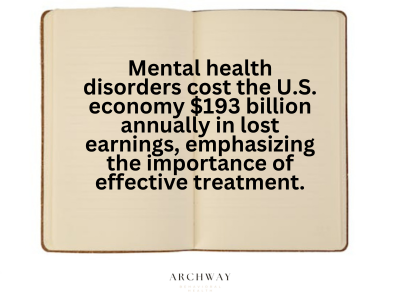Mental health challenges can significantly affect all aspects of life, including relationships, work, and overall well-being. Seeking help through a Mental Health Rehab Program is a critical step toward recovery, offering a structured and supportive environment where individuals can address their challenges and learn strategies to improve their mental health. Understanding the components of mental health rehab and how to navigate this journey is essential for anyone seeking treatment for themselves or a loved one.
At Archway Behavioral Health, we provide evidence-based and holistic mental health services tailored to meet the unique needs of each individual. Our offerings include Individual Therapy, Psychiatric Care, Group Therapy, and structured programs like the Partial Hospitalization Program (PHP) and Intensive Outpatient Program (IOP). Whether you are dealing with anxiety, depression, bipolar disorder, or other mental health conditions, our specialized programs provide a path to long-term recovery. This guide will help you understand mental health rehab, its benefits, and how it can transform lives.
What Is a Mental Health Rehab Program?
A Mental Health Rehab Program is a structured treatment framework designed to support individuals struggling with mental health challenges. These programs address a wide range of mental health conditions, including anxiety, depression, bipolar disorder, post-traumatic stress disorder (PTSD), and more. They provide a safe, supportive environment where individuals can focus on recovery through therapeutic interventions, medical care, and skill-building activities.
Core Elements of Mental Health Rehab Programs
- Comprehensive Assessment: Initial evaluations to identify the individual’s specific mental health needs and create a personalized treatment plan.
- Evidence-Based Therapies: Scientifically validated approaches like Cognitive Behavioral Therapy (CBT) and Dialectical Behavior Therapy (DBT).
- Psychiatric Support: Medication management and ongoing evaluations to stabilize symptoms.
- Skill Development: Training in emotional regulation, stress management, and interpersonal communication.
- Aftercare Planning: Tools and resources to maintain progress after completing the program.
Levels of Care in Mental Health Rehab Programs
Mental health rehab programs offer various levels of care to match the severity of symptoms and the individual’s stage of recovery. Each level provides varying degrees of structure and support.
1. Partial Hospitalization Program (PHP)
The Partial Hospitalization Program offers intensive, structured care for individuals who need comprehensive support but do not require round-the-clock supervision. PHP is ideal for those transitioning from inpatient care or those with severe symptoms needing a high level of care.
- What PHP Includes:
- Psychiatric Care: Regular evaluations and medication management.
- Therapy Sessions: Daily Individual Therapy, Group Therapy, and family therapy when needed.
- Skill-Building Workshops: Focus on managing stress, regulating emotions, and improving relationships.
- Who It’s For:
- Individuals with severe mental health symptoms.
- Those transitioning from inpatient care to outpatient treatment.
2. Intensive Outpatient Program (IOP)
The Intensive Outpatient Program provides flexible yet structured care for individuals balancing treatment with daily responsibilities like work or school. IOP allows clients to attend therapy sessions during the day and return home in the evenings.
- What IOP Includes:
- Weekly Individual Therapy sessions to address personal challenges.
- Regular Group Therapy for peer support and shared learning.
- Continued Psychiatric Care to monitor progress and adjust medications as needed.
- Who It’s For:
- Clients transitioning from PHP.
- Individuals with moderate symptoms requiring structured support.
3. Outpatient Therapy
Outpatient therapy offers the most flexibility and is ideal for individuals in the maintenance phase of their recovery. It typically involves weekly or bi-weekly sessions and provides ongoing support for long-term wellness.
- What Outpatient Therapy Includes:
- One-on-one therapy sessions to continue progress.
- Optional participation in Group Therapy for additional support.
- Psychiatric check-ins for medication adjustments.
- Who It’s For:
- Individuals with mild symptoms.
- Those seeking ongoing support after completing intensive programs.
Therapeutic Approaches in Mental Health Rehab
1. Individual Therapy
Individual Therapy is a cornerstone of mental health rehab, providing a personalized space for clients to explore their emotions, identify triggers, and develop coping strategies.
- Evidence-Based Approaches Used:
- CBT: Helps clients challenge and reframe negative thought patterns.
- DBT: Focuses on emotional regulation and distress tolerance.
- Trauma-Focused Therapy: Addresses the long-term effects of trauma on mental health.
- Benefits:
- Tailored to the individual’s unique needs.
- Helps build self-awareness and emotional resilience.
- Provides a confidential space for deep exploration.
2. Group Therapy
Group Therapy provides a supportive environment where individuals can share experiences, learn from peers, and practice interpersonal skills. Facilitated by a trained therapist, group sessions encourage mutual understanding and collective growth.
- Types of Groups:
- Psychoeducation: Teaches clients about mental health conditions and coping mechanisms.
- Skills Training: Focuses on stress management, communication, and emotional regulation.
- Support Groups: Builds a sense of community and reduces feelings of isolation.
- Benefits:
- Encourages accountability and mutual support.
- Offers diverse perspectives and shared problem-solving.
- Reduces feelings of stigma and isolation.
3. Psychiatric Care
Psychiatric Care is a vital part of mental health rehab, focusing on the medical aspects of mental health treatment. Psychiatrists evaluate symptoms, prescribe medications, and monitor progress.
- What Psychiatric Care Includes:
- Comprehensive diagnosis and symptom management.
- Medication adjustments to ensure effectiveness.
- Regular follow-ups to track progress and address any concerns.
- Benefits:
- Provides symptom relief for conditions like anxiety, depression, and bipolar disorder.
- Enhances the effectiveness of therapeutic interventions.
- Reduces the risk of relapse through consistent care.
Specialized Programs at Archway Behavioral Health
At Archway Behavioral Health, we recognize that every individual’s mental health journey is unique. That’s why we offer a variety of specialized programs tailored to meet the specific needs of our clients. These programs combine evidence-based therapies, compassionate care, and holistic approaches to provide comprehensive support.
1. Anxiety Treatment Program
Anxiety disorders can cause excessive worry, restlessness, and physical symptoms, making daily life challenging. Our Anxiety Treatment Program focuses on helping clients identify triggers, develop healthy coping mechanisms, and regain control over their lives.
- Core Components:
- Cognitive Behavioral Therapy (CBT) to address negative thought patterns.
- Mindfulness and relaxation techniques to reduce stress.
- Group therapy sessions for peer support and skill-building.
2. Depression Treatment Program
Depression can lead to persistent sadness, low energy, and a loss of interest in daily activities. Our Depression Treatment Program provides the tools and support needed to rebuild motivation and emotional well-being.
- Core Components:
- Individual Therapy to explore underlying causes and develop coping strategies.
- Psychiatric care for medication management and symptom stabilization.
- Holistic approaches, such as art therapy and physical activity, to boost mood.
3. Bipolar Treatment Program
Bipolar disorder is characterized by mood swings that can disrupt daily life. Our Bipolar Treatment Program helps individuals achieve mood stability and develop strategies for long-term management.
- Core Components:
- Mood stabilizers and regular psychiatric evaluations.
- Therapy to address both manic and depressive episodes.
- Psychoeducation to help clients and their families understand the condition.
4. Partial Hospitalization Program (PHP)
Our PHP offers intensive, structured care for individuals requiring significant support. Clients attend therapy sessions and workshops during the day while returning home in the evenings.
- Focus Areas:
- Emotional regulation and distress tolerance.
- Skill-building workshops for stress and relationship management.
- Comprehensive psychiatric care.
5. Intensive Outpatient Program (IOP)
Our IOP provides flexible yet structured care, ideal for individuals balancing recovery with daily responsibilities.
- Focus Areas:
- Weekly individual and group therapy sessions.
- Relapse prevention strategies.
- Ongoing psychiatric support.
Benefits of Mental Health Rehab Programs
Engaging in a Mental Health Rehab Program can be life-changing, offering a range of benefits that empower individuals to overcome challenges and achieve long-term wellness.
1. Comprehensive and Holistic Care
Mental health rehab programs address all aspects of a person’s well-being, from emotional and psychological to physical and social health. This integrated approach ensures that clients receive the support they need to heal.
2. Structured Support
The structured environment of rehab programs provides consistency, accountability, and a safe space to work through challenges. Daily routines help individuals build stability and establish healthy habits.
3. Evidence-Based Interventions
Programs use scientifically validated therapies, such as CBT, DBT, and trauma-focused approaches, to ensure effective and reliable outcomes.
4. Personalized Treatment Plans
Each program is tailored to the individual’s unique needs, goals, and mental health challenges. This customization increases the likelihood of successful recovery.
5. Peer Connection and Community
Group therapy and shared activities foster a sense of belonging and reduce feelings of isolation. Clients gain valuable insights from their peers and build supportive relationships.
6. Professional Oversight
Trained therapists and psychiatrists provide consistent monitoring and adjustments to treatment plans, ensuring clients are progressing and receiving the best care.
7. Long-Term Resilience
Rehab programs equip individuals with tools to manage symptoms, prevent relapse, and navigate future challenges confidently.
Why Choose Archway Behavioral Health?
At Archway Behavioral Health, we are dedicated to helping individuals navigate their mental health recovery journey. Our evidence-based and compassionate approach ensures that each client receives the tools and support they need to thrive.
What Sets Us Apart:
- Comprehensive Services: From Individual Therapy to structured programs like PHP and IOP, we offer a full continuum of care.
- Expert Team: Our licensed therapists and psychiatrists specialize in treating a wide range of mental health conditions.
- Personalized Care: Every treatment plan is tailored to the client’s unique needs and goals.
- Holistic Integration: We combine traditional therapies with holistic practices to promote overall well-being.
Conclusion
Navigating mental health rehab may feel overwhelming, but you don’t have to face it alone. At Archway Behavioral Health, our Mental Health Rehab Programs provide a safe and supportive environment where you can work toward lasting recovery.
Contact us today to learn more about our services, including Psychiatric Care, Group Therapy, and structured programs like PHP and IOP. Together, we can help you build a brighter, healthier future. Take the step toward reclaiming your life and health—contact us at (888) 488-4103.
FAQ for Navigating Mental Health Rehab
What is a mental health rehab program?
A mental health rehab program is a structured treatment plan designed to help individuals manage mental health conditions through therapy, psychiatric care, and skill-building in a supportive environment.
Who can benefit from a mental health rehab program?
Anyone struggling with mental health challenges such as anxiety, depression, bipolar disorder, or trauma can benefit from a tailored rehab program.
What services are included in mental health rehab?
Services typically include Individual Therapy, Group Therapy, Psychiatric Care, and structured programs like Partial Hospitalization Program (PHP) and Intensive Outpatient Program (IOP).
What is the difference between PHP and IOP?
- PHP: Offers intensive, daily therapy and psychiatric care, ideal for individuals with severe symptoms.
- IOP: Provides structured yet flexible care for individuals balancing treatment with daily responsibilities.
How long does mental health rehab last?
The duration varies based on individual needs, but programs can range from a few weeks for intensive care to several months for ongoing support.
Is psychiatric care included in rehab programs?
Yes, psychiatric care, including medication management and regular evaluations, is a critical component of most rehab programs.
Can I continue working or attending school while in rehab?
Yes, programs like IOP offer flexible schedules, allowing clients to balance treatment with work, school, or family responsibilities.



